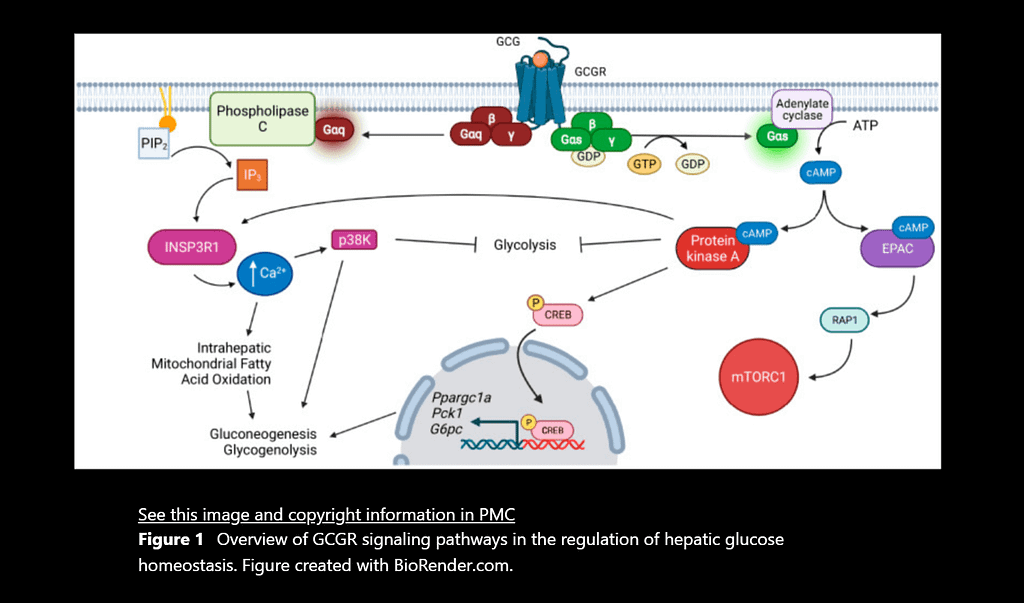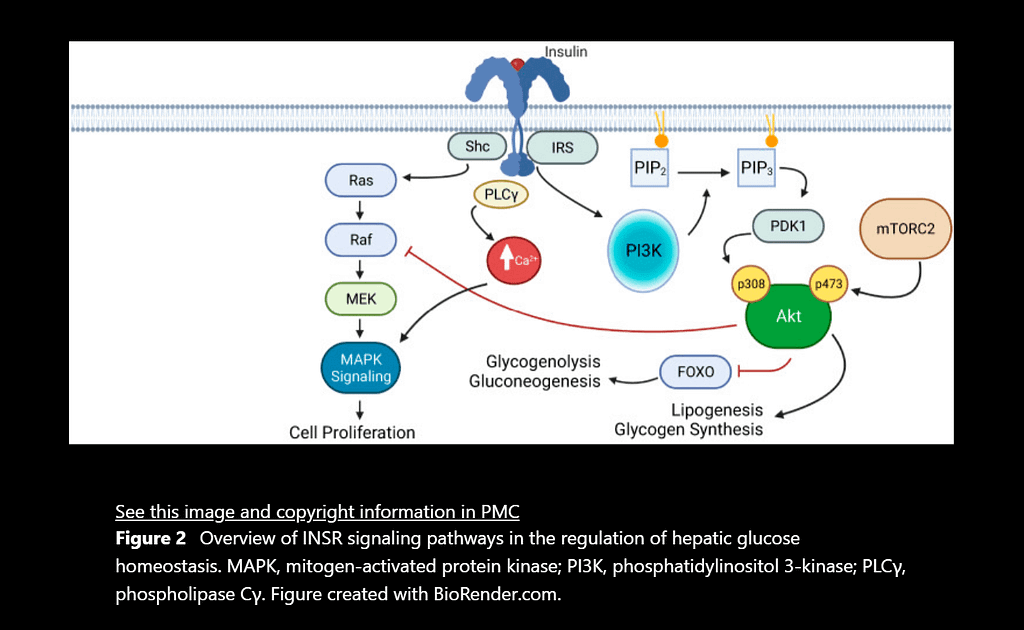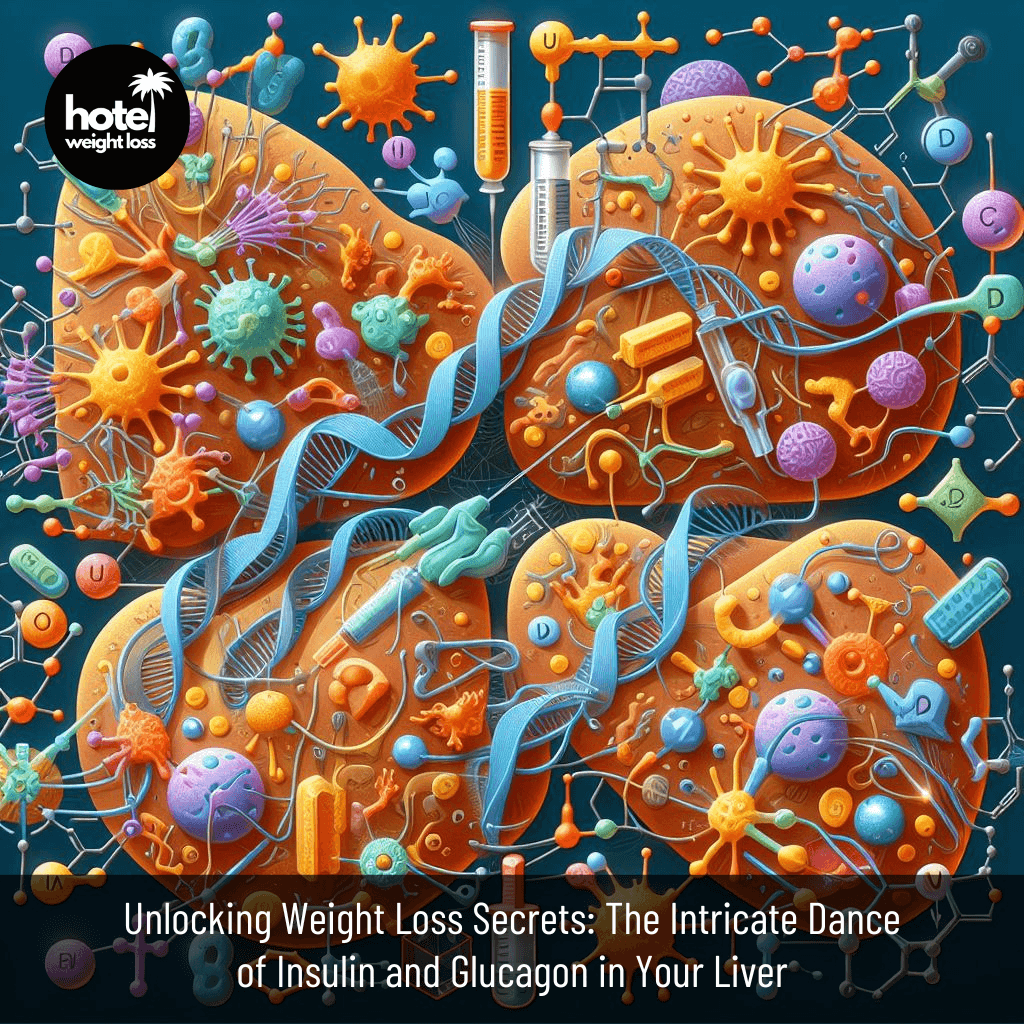Have you ever considered your liver the bustling control centre of your body’s weight management system? Picture it as a busy metropolis, where two essential hormones, insulin and glucagon, act as traffic controllers, orchestrating the energy flow within your body. In our exploration of “Cross Talk Between Insulin and Glucagon Receptor Signaling in the Hepatocyte,” authored by Kirk M. Habegger, we delve into the intricate mechanisms governing this dynamic interaction and its profound implications for weight loss.
Critical Takeaways
Before we dive into the depths of hepatocyte signalling, let’s highlight some critical takeaways from our journey through the cross-talk between insulin and glucagon receptors:
- Understanding Hormonal Balance: Achieving weight loss isn’t just about cutting calories; it’s about understanding the delicate balance of hormones like insulin and glucagon in your body.
- Liver’s Central Role: Your liver regulates metabolism and energy balance, making it a key player in your weight loss journey.
- Innovative Keto Diet Ideas: Harnessing the power of hormonal signaling, such as through ketogenic diets, can revolutionise your approach to weight loss.
Now, let’s embark on a guided tour through the fascinating world of hepatocyte signalling and its implications for shedding those stubborn pounds.
Insulin and Glucagon: The Dynamic Duo of Weight Management
The Role of Insulin in Liver Function
Insulin, often hailed as the body’s “fat-storing” hormone, plays a multifaceted role in liver function. Within hepatocytes, insulin is a potent signal for glucose uptake and storage, effectively lowering blood sugar levels after meals. Through its intricate signalling pathways, insulin promotes glycogen synthesis and lipogenesis and suppresses gluconeogenesis, thereby shifting the body into an anabolic state conducive to weight gain.
Implications for Weight Loss
While insulin’s actions are vital for maintaining energy balance, dysregulation of insulin signalling can lead to metabolic disorders such as insulin resistance and obesity. Individuals can tailor their dietary and lifestyle choices to optimise weight loss outcomes by understanding the nuances of insulin signalling in the liver.
Leveraging Insulin Sensitivity for Optimal Results
Enhancing insulin sensitivity through dietary strategies such as low-carbohydrate, high-fat ketogenic diets can promote efficient glucose utilisation and mitigate the risk of insulin resistance. By incorporating these principles into your weight loss regimen, you can harness the power of insulin signalling to achieve sustainable results.
Hotel Weight Loss Tip
Consult with our experts at Hotel Weight Loss to develop personalised ketogenic meal plans tailored to optimise insulin sensitivity and accelerate your weight loss journey.

Deciphering the Complexity of Glucagon Signaling
The Role of Glucagon in Liver Metabolism
In contrast to insulin, glucagon serves as the body’s “fat-burning” hormone, mobilising stored energy reserves to fuel metabolic processes during fasting or energy demand. Within hepatocytes, glucagon stimulates gluconeogenesis and glycogenolysis, elevating blood sugar levels to ensure a steady supply of glucose to peripheral tissues.
Implications for Weight Loss
Understanding the role of glucagon in liver metabolism is crucial for optimising weight loss strategies. By promoting gluconeogenesis and glycogenolysis, glucagon facilitates the utilisation of stored energy reserves, making it a key player in metabolic flexibility and fat loss.
Leveraging Glucagon for Fat Loss
Incorporating dietary strategies that promote glucagon secretion, such as intermittent fasting or high-protein, low-carbohydrate diets, can enhance fat oxidation and promote weight loss. By strategically timing meals and optimising nutrient composition, individuals can harness the metabolic benefits of glucagon signalling to achieve their weight loss goals.
Hotel Weight Loss Tip
Explore our tailored fasting protocols and high-protein meal plans at Hotel Weight Loss to harness the fat-burning potential of glucagon and accelerate your weight loss journey.
Facts and Figures
Find below Fig. 1 from the original journal article showcasing the role of GCGR signalling in the regulation of glucose homeostasis.

Credit: https://pubmed.ncbi.nlm.nih.gov/35657690/#&gid=article-figures&pid=figure-1-uid-0
Find below Fig. 2 from the original journal article showcasing the role of INSR signalling in the regulation of glucose homeostasis.

Conclusion
As we conclude our exploration of the cross-talk between insulin and glucagon receptor signalling in the hepatocyte, it’s clear that understanding the intricacies of hormonal regulation is critical to unlocking the secrets of weight loss. Individuals can optimise their metabolic health and achieve sustainable results by leveraging the dynamic interplay between insulin and glucagon. Contact our health specialists at Hotel Weight Loss to embark on a transformative journey towards a healthier, happier you.
FAQs
How does insulin affect weight loss?
What is glucagon’s role in weight management?
How can I optimise insulin sensitivity for weight loss?
What role does the liver play in weight management?
How does intermittent fasting impact weight loss?
What are the benefits of a ketogenic diet for weight loss?
How does exercise impact insulin and glucagon signalling?
What role does stress play in insulin and glucagon signalling?
How can Hotel Weight Loss assist me in my weight loss journey?
What makes Hotel Weight Loss unique?
Ready to unlock the secrets of weight loss through understanding glucagon and insulin? Contact Hotel Weight Loss today for expert guidance and personalised support on your journey to a healthier you.
Also, see Shed Pounds, Not Just Baggage: Top 7 Spa Weight Loss Strategies for Travelers
References
Habegger KM. Cross Talk Between Insulin and Glucagon Receptor Signaling in the Hepatocyte. Diabetes. 2022 Sep 1;71(9):1842-1851. doi: 10.2337/dbi22-0002. PMID: 35657690; PMCID: PMC9450567.
Banting FG, Best CH. The internal secretions of the pancreas. J Lab Clin Med 1922;5:251–266 [PubMed] [Google Scholar]
Kimball CP, Murlin JR. Aqueous extracts of pancreas. III. Some precipitation reactions of insulin. J Biol Chem 1923;58:337–346 [Google Scholar]
Murlin JR, Clough HD, Gibbs CBF, Stokes AM. Aqueous extracts of the pancreas. I. Influence on the carbohydrate metabolism of depancreatized animals. J Biol Chem 1923;56:253–296 [Google Scholar]
Bürger M, Brandt W. Über das glukagon (die hyperglykämisierende substanz des pankreas). Z Gesamte Exp Med 1935;96:375 [Google Scholar]




